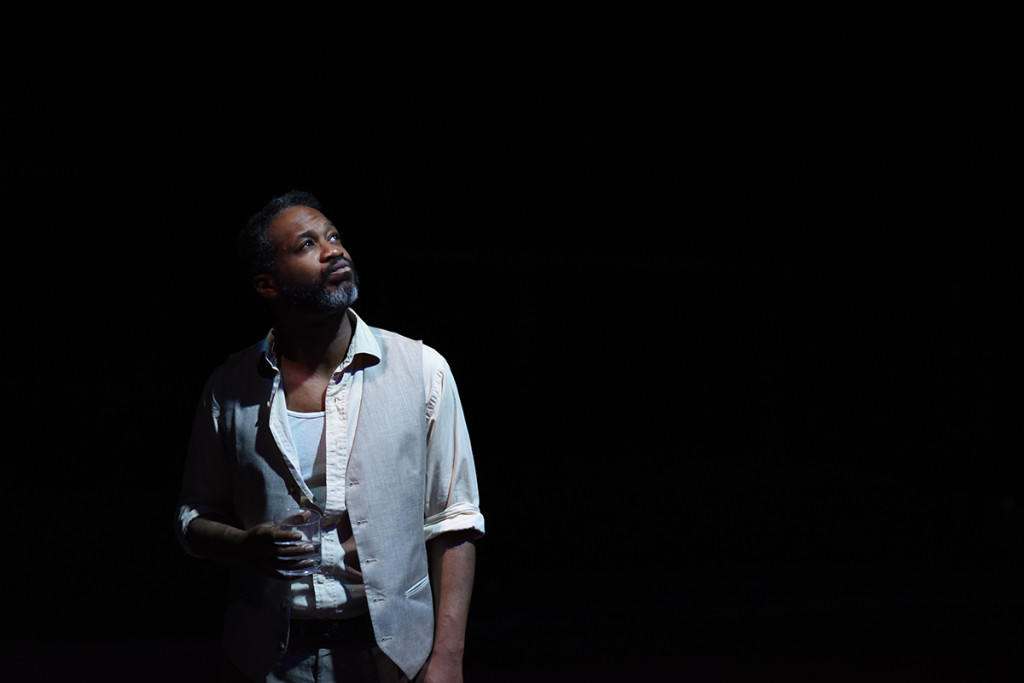
The characters in Annie Baker’s plays speak a language so precisely tailored to their personalities and lives it often feels like they are inventing it out of thin air. When Baker attempts to put her words in the mouths of Chekhov’s characters, the result is often stultifying, unimaginative, and frequently incomprehensible. That Quintessence Theatre Group uses her dull and intentionally anachronistic adaptation of UNCLE VANYA is only one of this misguided production’s many problems.
On paper, Baker and Chekhov would seem a perfect match. The great Russian playwright’s works have taken on an unfortunate air of stuffiness in recent decades, but although they’re often set in aristocratic manor houses and ostensibly deal with the privileged class, Chekhov’s characters are broken, searching people living perilous lives. So too are many of Baker’s subjects, who tend to either feel they’ve been left behind by the world or that they never had a chance to begin with. Yet Baker’s UNCLE VANYA—crafted from a literal translation of the Russian text by Margarita Shalina—strips any semblance of poetry from Chekhov’s scenes of country life. What remains is something that closely resembles modern speech patterns, but even then fails to mimic the naturalism that is so well-placed in other works by both playwrights. Never before have the hopeless Serebryakov family and their associates so regrettably resembled the “tedious, boring people” they are described as being.
Quintessence has always been committed to diversity in casting; a press release from the company describes their mission to “have the cast reflect the neighborhood” in which they perform (Mt. Airy). Director Alexander Burns’ one stroke of conceptual genius was to cast African American actors as the long-suffering Uncle Vanya and his dutiful niece Sonya. This color-conscious casting unlocks several levels of meaning both within the text and within Russian history, with its long, often ignored contributions made by people of African descent. Vanya and Sonya have worked themselves to the bone to support the frivolous lifestyle of Alexander Vladimirovich and his trophy wife, Yelena Andreyevna; they receive little recognition and even fewer thanks. They are also the only characters who are selflessly protective of the family’s estate, which was owned by Vanya’s sister (Alexander’s first wife) and is the birthright of Sonya (his daughter). Several recent productions of The Cherry Orchard have cast a black actor as serf-turned-millionaire Lopakhin, and the symbolic parallels might be more nakedly obvious in that choice. But Burns’ casting asks the audience to consider the role of servitude in UNCLE VANYA, and to me, that provided the most food for thought of the evening.
Unfortunately, few roles in this production are cast from strength. The actors tend to either overplay or underplay. Steven Wright’s blustery Vanya rarely betrays the character’s seething interior pain; I never believed this Vanya would come close to committing suicide. Likewise, Jessica M. Johnson’s weepy Sonya rarely scratches below the surface of her despair. It is hard to believe that anyone could be captivated by Julia Frey’s vapid and vacuous Yelena, and Kevin Bergen’s Dr. Astrov is merely petulant rather than disillusioned. To him, everyone is a “creep” (which seems to be Baker’s favorite word), or an asshole (the use of modern profanity feels more childish than jarring). The best work comes from Dan Kern, appropriately imperious as Alexander Vladimirovich, and Susan Chase’s endearingly doddering Marina, the family’s aged nanny.
The physical production is often as confused as Baker’s adaptation. Burns has staged this version in the round, which allows around thirty seats per section; I assume intimacy was the goal, with the actors never more than a few feet away from the audience at any given moment. This unfortunately means that wherever you sit, you’re bound to have actors facing away from you, robbing you of the reactions that are so key to understanding the intimate dynamics at play. Burns also designed the set, which never strikes the right balance between the old world and the new. The historical period of the play (roughly 1899) has ostensibly not been changed, yet the stage is strewn with modern conveniences—pill bottles from CVS, Bic pens, Milano cookies. The costumes (by Christina Lorraine Bullard) straddle the same line; I’m sure Bullard and Burns thought it they hit gold when they decided to put worker-girl Sonya in overalls for much of the play, but it feels too on the nose. John Burkland’s lighting design is similarly obvious: high-key in moments of anger, followed by dusky attempts at intimacy. Only Randy Redd’s original piano music (played live by the talented Daniel Ison) feels truly of the piece.
Good productions of Chekhov remind us of how vital his work still can be. Bad productions feed the narrative that his plays are dated, charmless, and inconsequential. After seeing Quintessence’s UNCLE VANYA, I finally understand why some people feel that way.
[Sedgwick Theater, 7137 Germantown Avenue, Mt. Airy] May 31-June 18, 2017; quintessencetheatre.org.
